from May. 2, 1865
Dispatch: William Hunter to Charles Francis Adams
-
Full Title
State Department Instruction 1383: William Hunter to Charles Francis Adams
-
Description
Dispatch from Acting Secretary of State William H. Hunter to Charles Francis Adams, U.S. Minister to the United Kingdom, concerning the latest news about the funeral of the assassinated President Abraham Lincoln (his body was in Chicago), the death of assassin John Wilkes Booth, and the surrender of Confederate General Joseph Johnston.
-
Transcription
Recd 14 May 1865
No 1383 Department of State Washington, 2nd May 1865
Sir:
The public press will have informed you of the honor done by the people to the remains of our lamented President on their transit of this city to Chicago which point they have now reached. The assassination, and the other atrocious attempt, have called forth gratifying expressions of condolence and sympathy from foreigners resident in the United States and from the Government and many of the cities of Canada.
With reference to military events I will mention that Macon Georgia was captured by General Wilson on the 13th ultimo when he was notified by Genl Sherman of the truce and withdrew.
When the truce between General Sherman and Johnston and the proposed terms of surrender were reported
Charles Francis Adams Esqre
[Transcription by: Taryn S. and her father David, Mr. Rude’s class, New Hampton Middle School, New Hampton, Iowa.]
-
Source
Office of the Historian, U.S. Department of State and National Archives, Record Group 84
-
Rights
This item is in the public domain and may be reproduced and used for any purpose, including research, teaching, private study, publication, broadcast or commercial use, with proper citation and attribution.
-
Tags
-
Cite this Item
William Hunter. "State Department Instruction 1383: William Hunter to Charles Francis Adams". Remembering Lincoln. Web. Accessed December 15, 2025. https://rememberinglincoln.fords.org/node/748
-
Creator
William Hunter
-
Date
May 2, 1865
from May. 2, 1865
State Department Instruction 1383: William Hunter to Charles Francis Adams
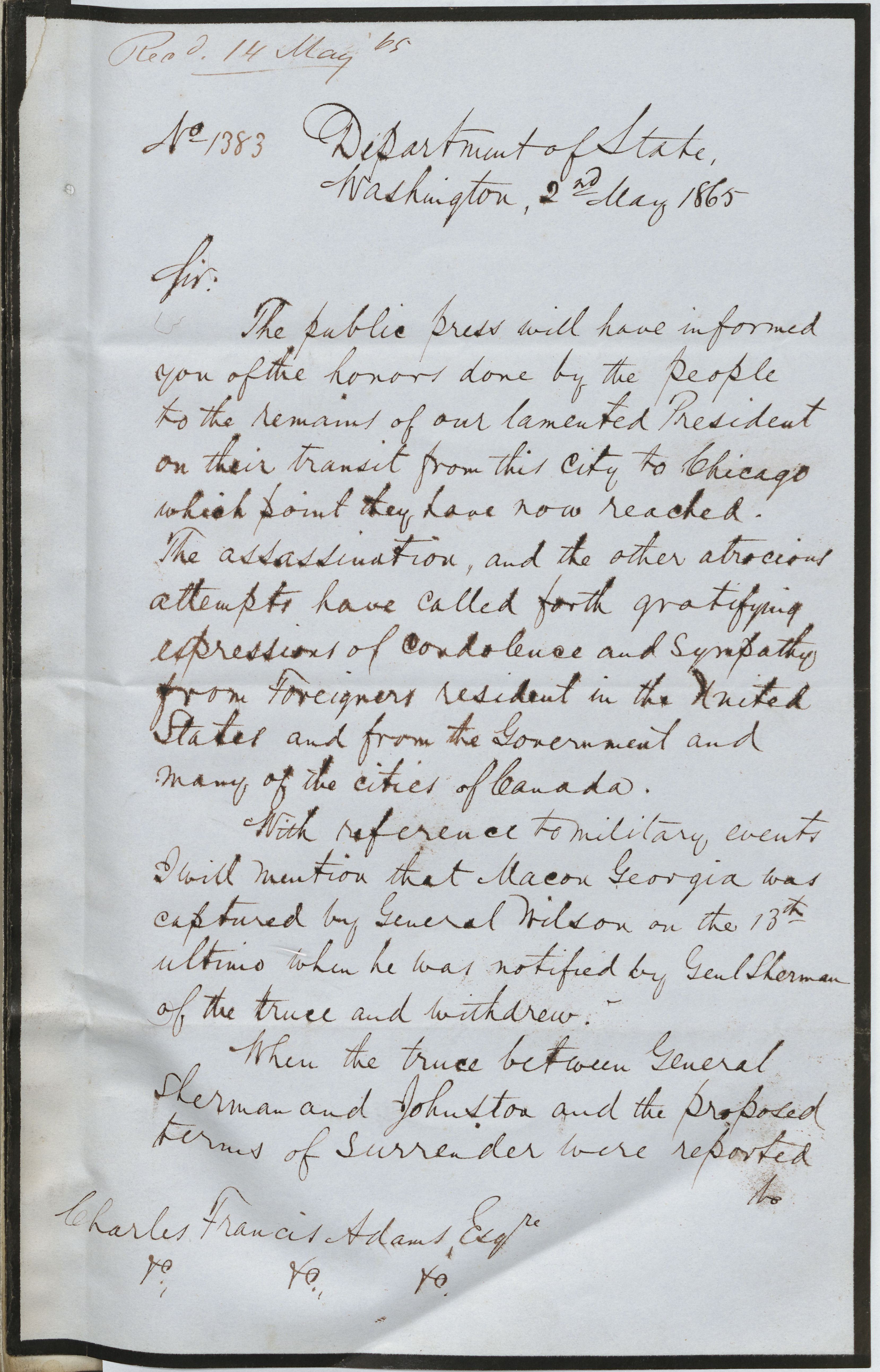
-
Description
Dispatch from Acting Secretary of State William H. Hunter to Charles Francis Adams, U.S. Minister to the United Kingdom, concerning the latest news about the funeral of the assassinated President Abraham Lincoln (his body was in Chicago), the death of assassin John Wilkes Booth, and the surrender of Confederate General Joseph Johnston.
-
Source
Office of the Historian, U.S. Department of State and National Archives, Record Group 84
-
Rights
This item is in the public domain and may be reproduced and used for any purpose, including research, teaching, private study, publication, broadcast or commercial use, with proper citation and attribution.
-
Creator
William Hunter
-
Date
May 2, 1865
from May. 1, 1865
Earl Russell to Adams
-
Full Title
Foreign Minister Earl Russell to Minister Charles Francis Adams
-
Description
A letter from Earl Russell, Foreign Minister of the United Kingdom, to Charles Francis Adams, U.S. Minister to the United Kingdom, acknowledging receipt of the official news of Lincoln's assassination and expressing his government's condolences.
-
Transcription
“Foreign Minister Earl Russell to Minister Charles Francis Adams”
Read. 2^[[d]] May, 1865.
Foreign Office
May 1. 1865.
Sir,
I have had the honour to receive
your note of this day’s date, officially
communicating to me the mealancholy
intelligence of the death, by the
hand of an assassin, of the Late
President of the United States.
When the first intelligence of
this had calamity reached this
country I [[convade]] to you by letter
and in person the deep impression
of horror and indignation which
Thanks Francis Adams Log
so atrocious a crime on the [[person]]
of the President of the United States
had made upon me and on the [[general]]
members of Her Majesty’s Government;
And it only [[remains]] for me now,
[[by]] acknowledging your letter, &
[[acquaint]] you that, by the command
of the Queen, I have directed Her
Majesty's Minister at Washington
to [[conoly]] to the government of the of the
United States the appearance that
Her Majesty sincerely condoles with
the family of the late President, and
that Her
Her Majesty’s Government and the
British Parliament and the British
Nation are affected by an unanimous
feeling of abhorrence of the
criminal guilty of this cowardly
and atrocious assassination, and
of their sympathy with the
Government and People of the
United States under the [[freak]]
calamity which has befallen them.
I have the honor to be with the
[[highest]] [[consideration]],
Sir,
Your [[British]] President,
Humble Servant,
Russell
[Transcription by: Alexis Ennis, Rachel Engl’s class, Lehigh University.] -
Source
Ford's Theatre National Historic Site, FOTH 3369, and National Archives, Record Group 84
-
Rights
This item is in the public domain and may be reproduced and used for any purpose, including research, teaching, private study, publication, broadcast or commercial use, with proper citation and attribution.
-
Tags
-
Cite this Item
John Russell, First Earl Russell. "Foreign Minister Earl Russell to Minister Charles Francis Adams". Remembering Lincoln. Web. Accessed December 15, 2025. https://rememberinglincoln.fords.org/node/747
-
Creator
John Russell, First Earl Russell
-
Date
May 1, 1865
from May. 1, 1865
Foreign Minister Earl Russell to Minister Charles Francis Adams
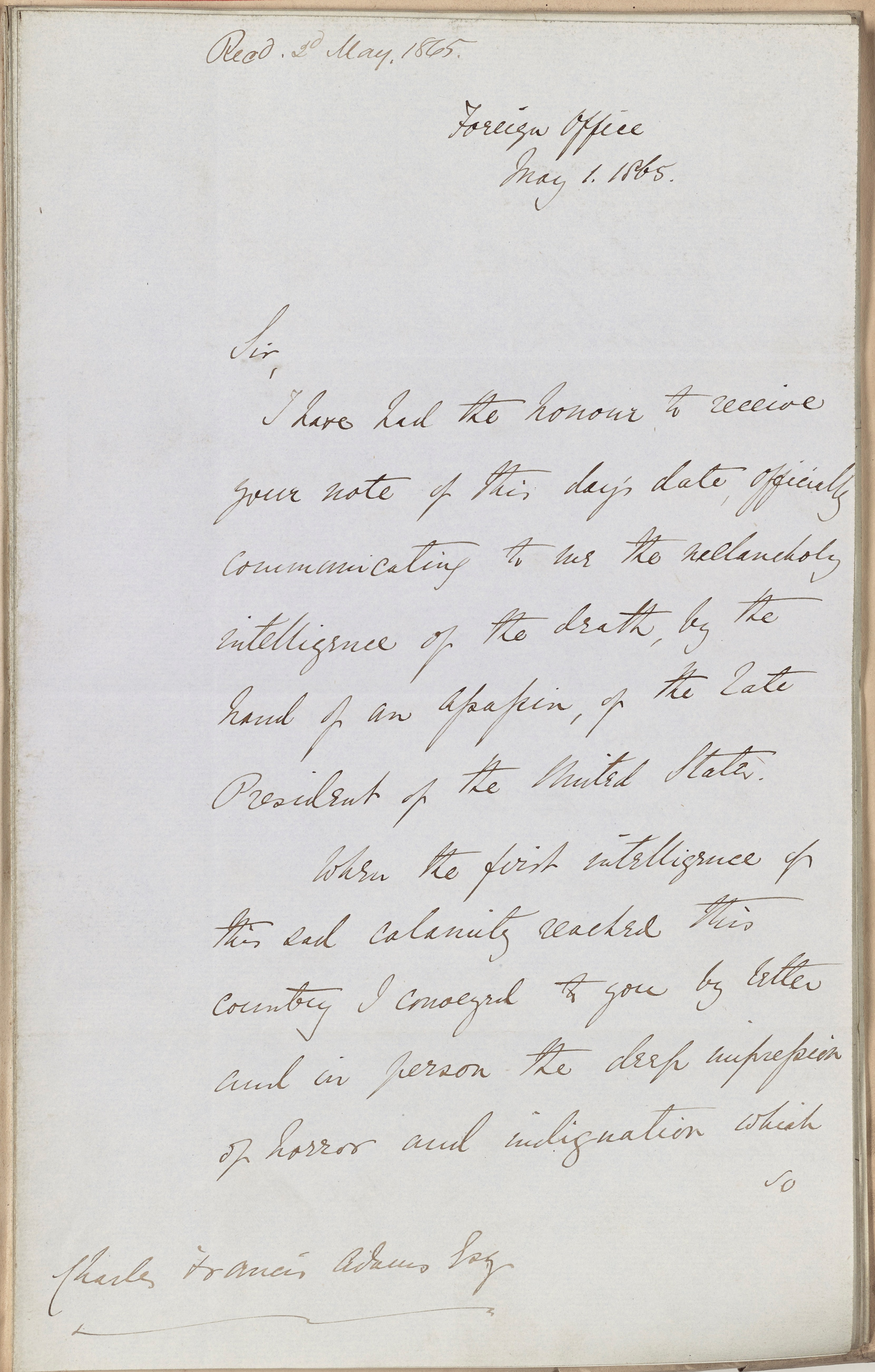
-
Description
A letter from Earl Russell, Foreign Minister of the United Kingdom, to Charles Francis Adams, U.S. Minister to the United Kingdom, acknowledging receipt of the official news of Lincoln's assassination and expressing his government's condolences.
-
Source
Ford's Theatre National Historic Site, FOTH 3369, and National Archives, Record Group 84
-
Rights
This item is in the public domain and may be reproduced and used for any purpose, including research, teaching, private study, publication, broadcast or commercial use, with proper citation and attribution.
-
Creator
John Russell, First Earl Russell
-
Date
May 1, 1865
from May. 1, 1865
Charles Francis Adams to Foreign Minister Earl Russell
-
Full Title
Charles Francis Adams to Foreign Minister Earl Russell
-
Description
Letterbook copy of dispatch from Charles Francis Adams, U.S. Minister to the United Kingdom, to John Russell, First Earl Russell, Foreign Minister of the United Kingdom, informing him of Lincoln's assassination.
-
Source
Office of the Historian, U.S. Department of State, and National Archives, Record Group 84
-
Rights
This item is in the public domain and may be reproduced and used for any purpose, including research, teaching, private study, publication, broadcast or commercial use, with proper citation and attribution.
-
Tags
-
Cite this Item
Charles Francis Adams. "Charles Francis Adams to Foreign Minister Earl Russell". Remembering Lincoln. Web. Accessed December 15, 2025. https://rememberinglincoln.fords.org/node/746
-
Creator
Charles Francis Adams
-
Date
May 1, 1865
from May. 1, 1865
Charles Francis Adams to Foreign Minister Earl Russell

-
Description
Letterbook copy of dispatch from Charles Francis Adams, U.S. Minister to the United Kingdom, to John Russell, First Earl Russell, Foreign Minister of the United Kingdom, informing him of Lincoln's assassination.
-
Source
Office of the Historian, U.S. Department of State, and National Archives, Record Group 84
-
Rights
This item is in the public domain and may be reproduced and used for any purpose, including research, teaching, private study, publication, broadcast or commercial use, with proper citation and attribution.
-
Creator
Charles Francis Adams
-
Date
May 1, 1865
from Apr. 28, 1865
Dispatch: Charles Francis Adams to Seward
-
Full Title
Embassy Despatch 936: Charles Francis Adams to William H. Seward
-
Description
Official dispatch from Charles Francis Adams, U.S. Minister to the United Kingdom, to William H. Seward, Secretary of State, acknowledging receipt of the news of the attacks upon Seward and President Abraham Lincoln, and discussing reaction in London.
-
Transcription
Aug 13, my [[Lincoln]]
[[tchfy1408]] [[Abe]]
No. 936.
Legation of the United States
London, 28 April, 1865
Sir:
I had the grief to receive the
day before yesterday the telegraphic
Despatches from Mr. Stanton, the
Secretary of War, and from Mr.
Hunter, the Chief Clerk of your
Department, announcing the af-
flicting event of the 14th, Instant
which has thrown our whole
people into such deep distress.
They also give a narrative of the
simultaneously savage onslaught
upon yourself in your sick room
and upon your son, the assistant
Secretary, which had not at the
latest date, and which I yet
permit myself to hope, will not
prove
The Hon: William H. Seward
Secretary of State.
Washington, D.C.
(Next Page)
prove fatal to either you.
I immediately took the
requisite measures to communicate
the intelligence to the different
legislators on the Continent.
It is but consistency that
a rebellion began in
perjury, treachery and fraud
should close with private
assassination.
The whole of the day was
one of the greatest excitements.
Few events of the present century
have created such general
consternation and indignation.
Many people called personally
at the legation to express their
deep sympathy and many more
sent me notes of the same tenor.
The notice taken by the
press are almost all of them
of a most honorable character.
(A. Hancock)
I transmit copies of the
leading newspapers. There
seems at last to be a general
testimony borne to the north noble
qualities
(Next Page)
qualities of the president and
the friendly disposition of the
Secretary of State.
Of all this eulogy he found
mingled with the alloy of
unworthy aspersions of the vice
President who succeeds, he has
abundant consolation in the
reflection that, when his predecessor
began, he was not a whit better
treated. It is a weakness of the
press and the people of this country
not to value some men properly
until they are lost. The cause of
the late Prince Consort is a
unremarkable instance.
The proceedings in the two
Houses of Parliament last evening
mark out the line proposed to
be adopted by the government
on this occasion.
I have the honor to be Sir,
your obedient servant,
Charles Francis Adams
[Transcription Team: Carli G., Summer D., Joslyn P., Tyler R.]
[New Hampton Middle School, New Hampton, Iowa] -
Source
Office of the Historian, U.S. Department of State and National Archives, Record Group 84
-
Rights
This item is in the public domain and may be reproduced and used for any purpose, including research, teaching, private study, publication, broadcast or commercial use, with proper citation and attribution.
-
Tags
-
Cite this Item
Charles Francis Adams. "Embassy Despatch 936: Charles Francis Adams to William H. Seward". Remembering Lincoln. Web. Accessed December 15, 2025. https://rememberinglincoln.fords.org/node/745
-
Creator
Charles Francis Adams
-
Date
April 28, 1865
from Apr. 28, 1865
Embassy Despatch 936: Charles Francis Adams to William H. Seward
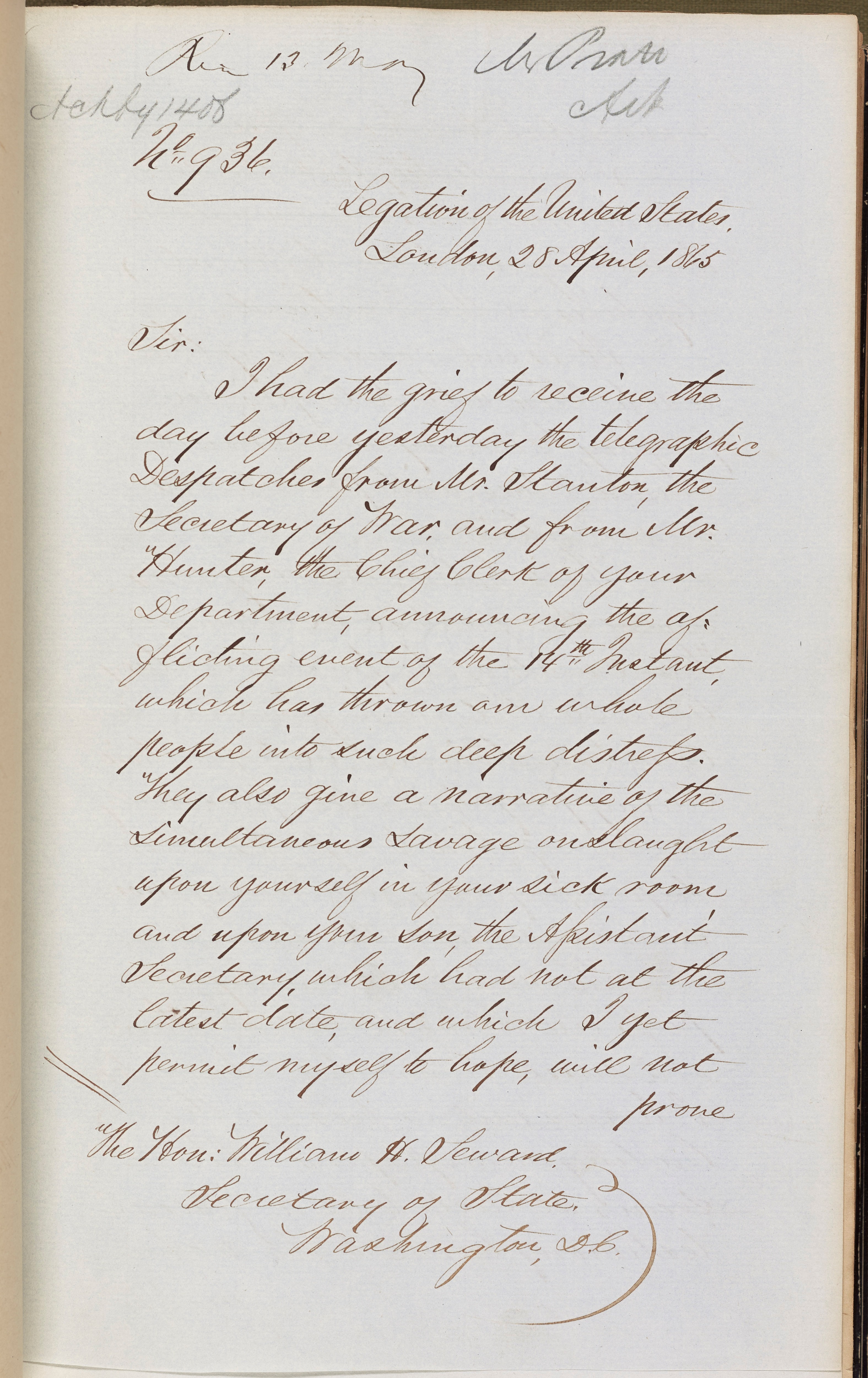
-
Description
Official dispatch from Charles Francis Adams, U.S. Minister to the United Kingdom, to William H. Seward, Secretary of State, acknowledging receipt of the news of the attacks upon Seward and President Abraham Lincoln, and discussing reaction in London.
-
Source
Office of the Historian, U.S. Department of State and National Archives, Record Group 84
-
Rights
This item is in the public domain and may be reproduced and used for any purpose, including research, teaching, private study, publication, broadcast or commercial use, with proper citation and attribution.
-
Creator
Charles Francis Adams
-
Date
April 28, 1865
from Apr. 17, 1865
Instruction, Hunter to Adams
-
Full Title
State Department Instruction 1352: William Hunter to Charles Francis Adams
-
Description
Official dispatch from William H. Hunter to Charles Francis Adams, U.S. Minister to the United Kingdom, informing him of Lincoln's assassination and the attempt on Secretary of State William H. Seward's life. Hunter notes that William and Frederick Seward are both expected to recover, but that, in the meanwhile, Hunter is serving as Acting Secretary of State. Because the Transatlantic telegraph cable was no longer functioning, Adams received this dispatch on April 30.
-
Transcription
Read. 30 Apr. 65.
Circular
No. 1352
Department of state.
Washington. 17th April 1865
Sir:
The melancholy duty devolves
upon me officially to apprise
You of the assassination of the
president at Ford’s theatre in this
city in the evening of the 14th instant.
He died the next morning from
the effects of the wound.
About the same time an
attempt was made to assassinate
the Secretary of State in his own
house where he was in bed &
Suffering from the effects of the
late accident. The attempt failed, but Mr. Seward was
severely cut, on the face especially
it is supposed with a bowie knife.
Mr J; H, Seward was felled by a
blow or blows on the head, from
the assassin, and for some time
afterwards was apparently
Unconscious
Charles Francis Adam, Esquire,
Next page
Unconscious. Both the Secretary
and assistant Secretary are better
especially the former.
Andrew Johnson has formally
entered upon the duties of
President.
I have been authorized
temporarily to act as Ssecretary
of State.
[[?]], Sir
Your obedient servant
W.J. Hunter
Acting Secretary
[Transcription Team: Joshua H., Caleb D., Conner R., Carson B.]
[New Hampton Middle School, New Hampton, Iowa]
-
Source
Office of the Historian, U.S. Department of State and National Archives, Record Group 84
-
Rights
This item is in the public domain and may be reproduced and used for any purpose, including research, teaching, private study, publication, broadcast or commercial use, with proper citation and attribution.
-
Tags
-
Cite this Item
William Hunter. "State Department Instruction 1352: William Hunter to Charles Francis Adams". Remembering Lincoln. Web. Accessed December 15, 2025. https://rememberinglincoln.fords.org/node/744
-
Creator
William Hunter
-
Date
April 17, 1865
from Apr. 17, 1865
State Department Instruction 1352: William Hunter to Charles Francis Adams
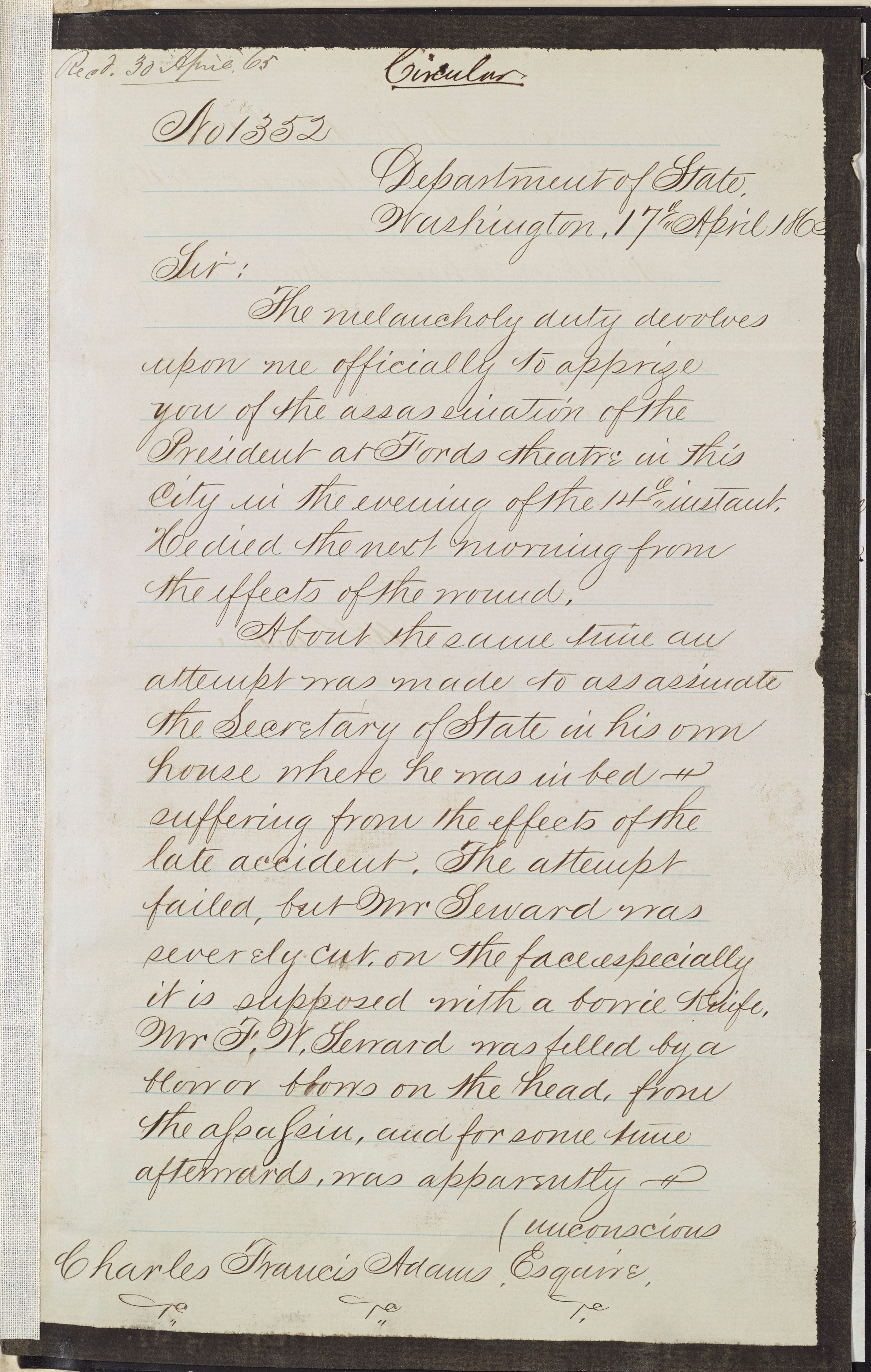
-
Description
Official dispatch from William H. Hunter to Charles Francis Adams, U.S. Minister to the United Kingdom, informing him of Lincoln's assassination and the attempt on Secretary of State William H. Seward's life. Hunter notes that William and Frederick Seward are both expected to recover, but that, in the meanwhile, Hunter is serving as Acting Secretary of State. Because the Transatlantic telegraph cable was no longer functioning, Adams received this dispatch on April 30.
-
Source
Office of the Historian, U.S. Department of State and National Archives, Record Group 84
-
Rights
This item is in the public domain and may be reproduced and used for any purpose, including research, teaching, private study, publication, broadcast or commercial use, with proper citation and attribution.
-
Creator
William Hunter
-
Date
April 17, 1865
from Apr. 15, 1865
Stanton Dispatch to Charles Francis Adams
-
Full Title
Dispatch, Edwin Stanton to Charles Francis Adams
-
Description
The official dispatch from U.S. Secretary of War Edwin Stanton to Charles Francis Adams, U.S. Minister to the United Kingdom, notifying the latter of the assassination of President Abraham Lincoln. Because the Transatlantic telegraph line was no longer operational, Adams did not receive the news for 11 days.
-
Transcription
Recd. 26 April, 1865
Charles Francis Adams
United States Minister, London
Washington, DC 15 April, 1865
Sir.
It has become my distressing duty to announce to you that last night His Excellency Abraham Lincoln President of The United States, was assassinated, about the hour of half past 10 o’clock, in his private box at Ford’s Theatre, in this city. The President about eight o’clock accompanied Mrs. Lincoln to the theatre. Another lady and gentleman were with them in the box. About half past ten during a pause in the performance, the assassin entered the box, the door of which was unguarded, hastily approached the President from behind, and discharged a pistol at his head. The bullet entered the back of his head, and penetrated nearly through. The assassin then leaped from the box upon the stage, brandishing a large knife or dagger, and exclaiming ‘Sic semper tyrannis!’ and escaped in the rear of the theatre. Immediately upon the discharge the President fell to the floor insensible, and continued in that state until 20 minutes past 7 o’clock this morning when he breathed his last. About the same time the murder was being committed at the Theatre another assassin presented himself at the door of Mr. Seward’s residence, gained admission by representing he had a prescription from Mr. Seward’s physicians which he was directed to see administered and hurried up to the third story chamber where Mr. Seward was lying. He here discovered Mr. Frederick Seward, struck him over the head, inflicting several wounds, and fracturing the skull in two places, inflicting, it is feared mortal wounds. He then rushed into the room where Mr. Seward was in bed, attended by a young daughter and a male nurse. The male attendant was stabbed through the lungs, and it is believed will die. The assassin then struck Mr. Seward with a knife or dagger twice in the throat and twice in the face, inflicting terrible wounds. By this time Major Seward, eldest son of the Secretary, and another attendant reached the room, and rushed to the rescue of the Secretary; they were also wounded in the conflict, and the assassin escaped. No artery or important blood vessel was severed by any of the wounds inflicted upon him, but he was for a long time insensible from the loss of blood. Some hope of his possible recovery is entertained. Immediately upon the death of the President notice was given to Vice President Johnson, who happened to be in the City, and upon whom the office of President now devolves. He will take the office and assume the functions of President to-day. The murderer of the President has been discovered, and evidence obtained that these horrible crimes were committed in execution of conspiracy deliberately planned and set on foot by rebels on pretence of avenging the South and aiding the rebel cause; but it is hoped that the (?) perpetrators will be caught.
The feeling occasioned by these atrocious crimes is so great, sudden, and overwhelming that I cannot at present do more than communicate them to you. At the earliest moment yesterday the late President called a Cabinet meeting, at which General Grant was present. He was more cheerful and happy than I had ever seen him, rejoiced at the near prospect of firm and durable peace at home and abroad, manifested in a marked degree the kindness and humanity of his disposition, and the tender and forgiving spirit that so eminently distinguished him. Public notice had been given that he and General Grant, would be present at the Theatre, and the opportunity of adding the Lieutenant General to the number of victims to be murdered was no doubt seized for the fitting occasion of executing the plans that appear to have been in preparation for some weeks, but General Grant was compelled to be absent, and thus escaped the designs upon him. It is needless for me to say anything in regard to the influence which this atrocious murder of the President may exercise upon the affairs of this country, but I will only add that, horrible as are the atrocities that have been resorted to by the enemies of the country, they are not likely in any degree to impair the public spirit, or postpone the complete and final overthrow of the rebellion. In profound grief for the events, which it has become my duty to communicate to you,
I have the honor to be
Very respectfully
Your obt. Servant
Edwin M. Stanton
[Transcription by Dale Anderson.] -
Source
Office of the Historian, U.S. Department of State and National Archives, Record Group 84
-
Rights
This item is in the public domain and may be reproduced and used for any purpose, including research, teaching, private study, publication, broadcast or commercial use, with proper citation and attribution.
-
Tags
-
Cite this Item
Edwin Stanton. "Dispatch, Edwin Stanton to Charles Francis Adams". Remembering Lincoln. Web. Accessed December 15, 2025. https://rememberinglincoln.fords.org/node/743
-
Creator
Edwin Stanton
-
Date
April 15, 1865
from Apr. 15, 1865
Dispatch, Edwin Stanton to Charles Francis Adams

-
Description
The official dispatch from U.S. Secretary of War Edwin Stanton to Charles Francis Adams, U.S. Minister to the United Kingdom, notifying the latter of the assassination of President Abraham Lincoln. Because the Transatlantic telegraph line was no longer operational, Adams did not receive the news for 11 days.
-
Source
Office of the Historian, U.S. Department of State and National Archives, Record Group 84
-
Rights
This item is in the public domain and may be reproduced and used for any purpose, including research, teaching, private study, publication, broadcast or commercial use, with proper citation and attribution.
-
Creator
Edwin Stanton
-
Date
April 15, 1865
from Apr. 20, 1865
"The Last of the Earth"
-
Full Title
"The Last of the Earth. The Greatest Demonstration Ever Made on the Pacific Coast"
-
Description
April 20, 1865 edition of San Francisco's Daily Alta in which the article describes the funeral obsequies performed for Lincoln.
-
Source
Library of Congress Alfred Whital Stern Collection of Lincolniana, portfolio 6, no. 4
-
Rights
This item is in the public domain and may be reproduced and used for any purpose, including research, teaching, private study, publication, broadcast or commercial use, with proper citation and attribution
-
Tags
-
Cite this Item
Daily Alta. ""The Last of the Earth. The Greatest Demonstration Ever Made on the Pacific Coast"". Remembering Lincoln. Web. Accessed December 15, 2025. https://rememberinglincoln.fords.org/node/742
-
Creator
Daily Alta
-
Date
April 20, 1865
from Apr. 20, 1865
"The Last of the Earth. The Greatest Demonstration Ever Made on the Pacific Coast"

-
Description
April 20, 1865 edition of San Francisco's Daily Alta in which the article describes the funeral obsequies performed for Lincoln.
-
Source
Library of Congress Alfred Whital Stern Collection of Lincolniana, portfolio 6, no. 4
-
Rights
This item is in the public domain and may be reproduced and used for any purpose, including research, teaching, private study, publication, broadcast or commercial use, with proper citation and attribution
-
Creator
Daily Alta
-
Date
April 20, 1865
from Apr. 16, 1865
"Horrible News! Culmination of Southern Fanaticism and Barbarism"
-
Full Title
"Horrible News! Culmination of Southern Fanaticism and Barbarism"
-
Description
April 16, 1865 edition of the Dubuque Daily Times from Dubuque, Iowa announcing the assassination and denouncing the act.
-
Source
Library of Congress, Alfred Whital Stern Collection of Lincolniana portfolio 8
-
Rights
This item is in the public domain and may be reproduced and used for any purpose, including research, teaching, private study, publication, broadcast or commercial use, with proper citation and attribution
-
Tags
-
Cite this Item
Dubuque Daily Times. ""Horrible News! Culmination of Southern Fanaticism and Barbarism"". Remembering Lincoln. Web. Accessed December 15, 2025. https://rememberinglincoln.fords.org/node/741
-
Creator
Dubuque Daily Times
-
Date
April 16, 1865
from Apr. 16, 1865
"Horrible News! Culmination of Southern Fanaticism and Barbarism"

-
Description
April 16, 1865 edition of the Dubuque Daily Times from Dubuque, Iowa announcing the assassination and denouncing the act.
-
Source
Library of Congress, Alfred Whital Stern Collection of Lincolniana portfolio 8
-
Rights
This item is in the public domain and may be reproduced and used for any purpose, including research, teaching, private study, publication, broadcast or commercial use, with proper citation and attribution
-
Creator
Dubuque Daily Times
-
Date
April 16, 1865
from Apr. 17, 1865
The Intelligencer
-
Full Title
The Intelligencer, April 17, 1865
-
Description
April 17, 1865 edition of The Intelligencer which recounts the assassination and offers eloquent words of praise for Lincoln, stating, "Abraham Lincoln is mourned more widely, more warmly, more inconsolably than any of his predecessors in the Presidential Chair. The man himself, is not less than the unprecedented circumstances of his administration, and the appalling manner of his death, appealed to the popular heart for an outpouring of sympathizing testimonial" [...]
Attributes the murder to the "the same hand that has been so long raised to deal a fatal blow to his country, and that has struck down so many of our noblest and best, has at last laid low the chosen chief. Slavery, treason and assassination culminated in the act. More than ever all these will henceforth be accused of mankind."
The article also strongly condemns the conspirators, saying "they are bound together by the most horrible and dreadful oath" and that "once [Booth] is caught the last means every devised to extort confession and implication from criminals should be practiced upon him." -
Source
-
Rights
This item is in the public domain and may be reproduced and used for any purpose, including research, teaching, private study, publication, broadcast or commercial use, with proper citation and attribution
-
Tags
-
Cite this Item
Daily Intelligencer. "The Intelligencer, April 17, 1865". Remembering Lincoln. Web. Accessed December 15, 2025. https://rememberinglincoln.fords.org/node/740
-
Creator
Daily Intelligencer
-
Date
April 17, 1865
from Apr. 17, 1865
The Intelligencer, April 17, 1865
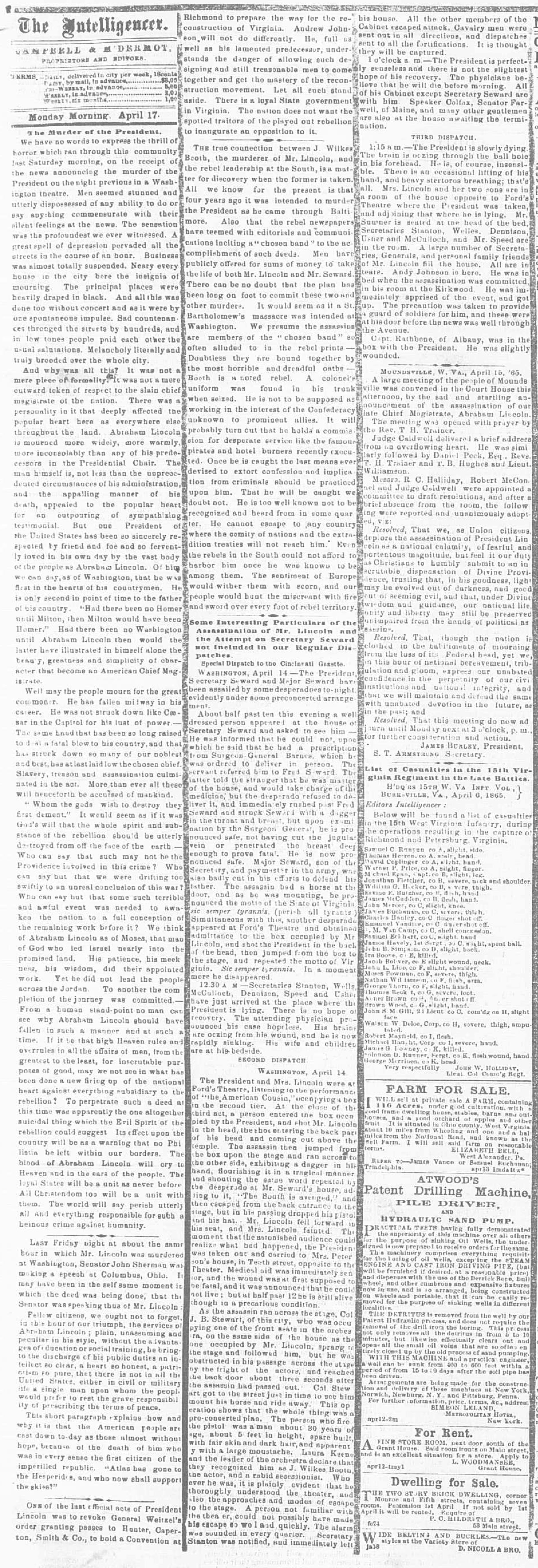
-
Description
April 17, 1865 edition of The Intelligencer which recounts the assassination and offers eloquent words of praise for Lincoln, stating, "Abraham Lincoln is mourned more widely, more warmly, more inconsolably than any of his predecessors in the Presidential Chair. The man himself, is not less than the unprecedented circumstances of his administration, and the appalling manner of his death, appealed to the popular heart for an outpouring of sympathizing testimonial" [...]
Attributes the murder to the "the same hand that has been so long raised to deal a fatal blow to his country, and that has struck down so many of our noblest and best, has at last laid low the chosen chief. Slavery, treason and assassination culminated in the act. More than ever all these will henceforth be accused of mankind."
The article also strongly condemns the conspirators, saying "they are bound together by the most horrible and dreadful oath" and that "once [Booth] is caught the last means every devised to extort confession and implication from criminals should be practiced upon him." -
Source
-
Rights
This item is in the public domain and may be reproduced and used for any purpose, including research, teaching, private study, publication, broadcast or commercial use, with proper citation and attribution
-
Creator
Daily Intelligencer
-
Date
April 17, 1865
from Apr. 15, 1865
"President Lincoln Dead"
-
Full Title
"President Lincoln Dead. Assassinated in the Theatre at Washington Last Night"
-
Description
The Daily Dispatch, from Erie, PA, announces the death of President Lincoln and provides many details of the attack at Ford's Theatre, as well as the other attack on Secretary of State William Seward.
-
Source
Library of Congress Alfred Whital Stern Collection of Lincolniana portfolio 16, no. 27
-
Rights
This item is in the public domain and may be reproduced and used for any purpose, including research, teaching, private study, publication, broadcast or commercial use, with proper citation and attribution
-
Tags
-
Cite this Item
Daily Dispatch. ""President Lincoln Dead. Assassinated in the Theatre at Washington Last Night"". Remembering Lincoln. Web. Accessed December 15, 2025. https://rememberinglincoln.fords.org/node/738
-
Creator
Daily Dispatch
-
Date
April 15, 1865
from Apr. 15, 1865
"President Lincoln Dead. Assassinated in the Theatre at Washington Last Night"
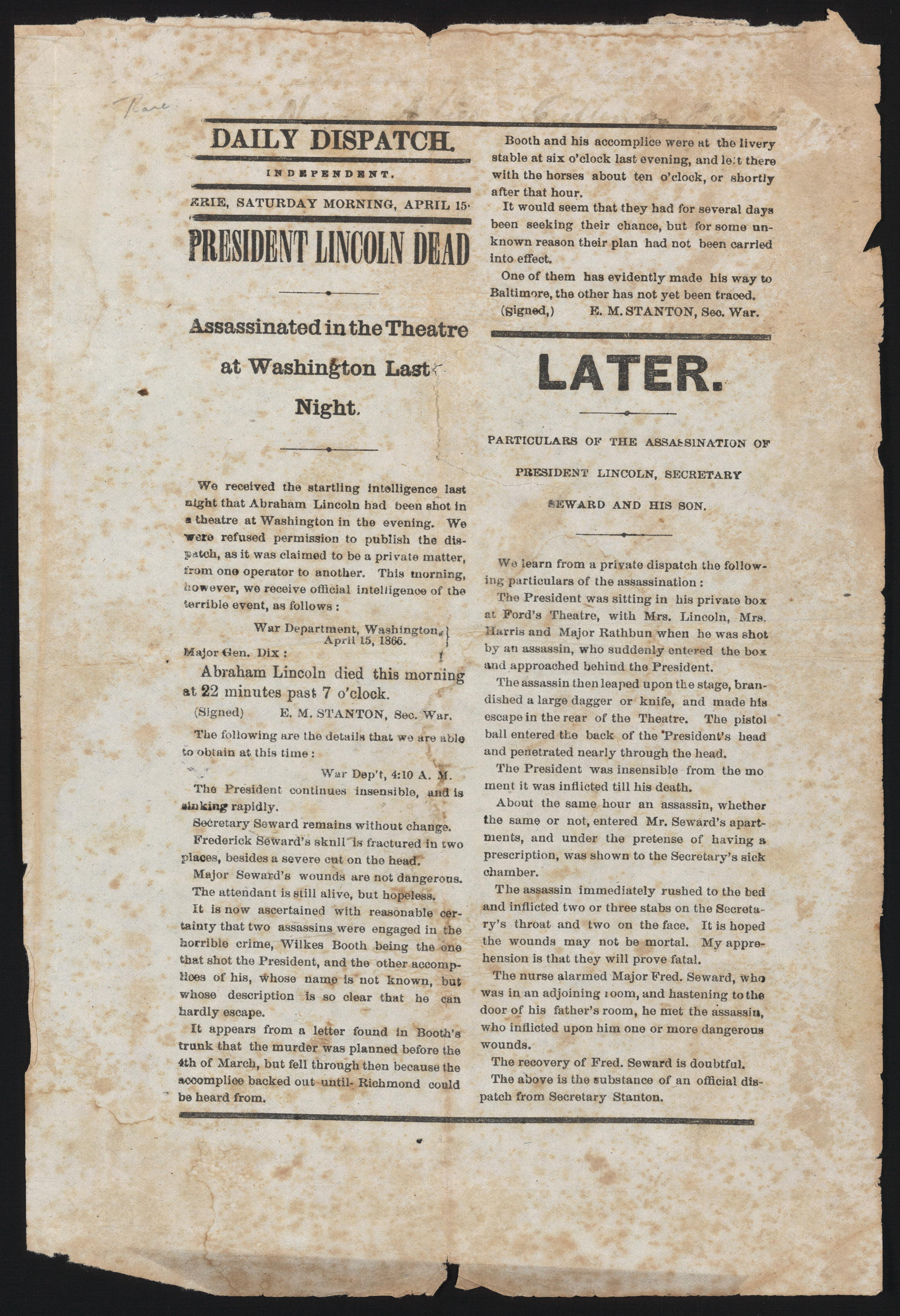
-
Description
The Daily Dispatch, from Erie, PA, announces the death of President Lincoln and provides many details of the attack at Ford's Theatre, as well as the other attack on Secretary of State William Seward.
-
Source
Library of Congress Alfred Whital Stern Collection of Lincolniana portfolio 16, no. 27
-
Rights
This item is in the public domain and may be reproduced and used for any purpose, including research, teaching, private study, publication, broadcast or commercial use, with proper citation and attribution
-
Creator
Daily Dispatch
-
Date
April 15, 1865